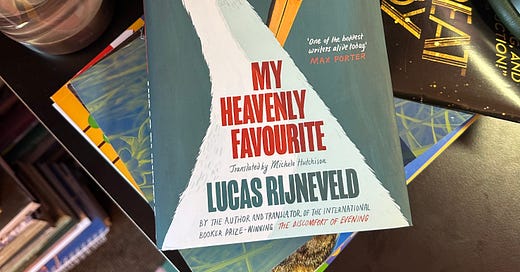When I was on stage with the Dutch writer Tobi Lakmaker in Foyles last month he told me that the Dutch literary scene consists of three categories — middle-aged white men, lesbians in their 30s, and transgender people. The Dutch scene is one that has had a bit of a hard time making it to the shores of the UK. The fiction of Herman Koch has been popular but I’ve found his writing to be a bit too commercial for my tastes. Gerard Reve’s books, which are classics in the Netherlands, have been getting some new translations here in recent years but his oeuvre still remains barely available in English. It wouldn’t be remiss to suggest that the majority of the Dutch representation on UK bookshelves is claimed by Lucas Rijneveld, the hot young thing of the Dutch scene who Faber cleverly picked up back in 2020 with his (eventual International Booker winning) The Discomfort of Evening.
Back when I wrote for the Irish Times for some reason, I reviewed The Discomfort of Evening as a “I need to pitch a book review and this one sounds the least terrible” deal. Naturally, the book ended up being great. I wrote that Rijneveld’s “poetic prose, eloquently translated by Michele Hutchison, clashes and rattles against the horrors it describes, a constant fight between terror and beauty.” (Side note: my early reviews really are fucking unreadable.) But that first novel was a welcome sign that here we had a writer who was into the freak shit. I remember passages describing how diarrhoea looks on grass, pieces of soap being inserted into an anus to heal constipation, and lots of other good stuff.
Little did I know that Rijneveld’s first novel was little more than a Trojan Horse. In my mind, the plan went something like this: Hello, I am Lucas Rijneveld and I have an idea. I’m going to write a novel that is almost transgressive. Nothing that will upset actual readers of literary fiction but maybe it’ll cause a scandal in a library group somewhere. With this book I’ll get an international deal, maybe Faber will pick it up, and maybe I’ll get a big award for it. Anyway, I’m only going to do that so I get my multiple book deal which will allow me to follow up my debut with the type of shit I really want to write, the type of stuff that’ll upset absolutely everyone and maybe even cause that annoying green-haired cunt Barry Pierce to be like, whoa now wait a second here. Maybe I’ll call it My Heavenly Favourite and make it a first-person narrative from the perspective of a pedophile trying to fuck a child. But I don’t want to do a Humbert Humbert type thing, I really want the whole novel to just be about child fucking.
You have got to hand it to Lucas Rijneveld. My Heavenly Favourite is one of the most transgressive novels put out by a mainstream publisher in years. I’m a huge Faber fanboy but even I cannot believe they actually put their logo on this. The inside flap even brandishes a content warning, “This novel is about an adult who is sexually attracted to a minor and contains sexual violence.” Literature is so back.
From the very first line My Heavenly Favourite is a Dennis Cooper-like journey through hell itself. Our narrator is a vet who does the rounds of the farms in his area of the Netherlands. One of the local farmer’s daughters, a fourteen year old girl, has become the object of his lust. The novel is a slow-burn, we are taken through the beginnings of the narrator’s innocent friendship with the girl. Then, in glacial and, therefore, painful, pacing, we watch as he plots and plans how he can get closer to her, how he begins introducing her to music and films and books, taking her on trips to the cinema, bringing her little gifts, asking her if she has any boyfriends.
This is not a novel of subtlety, because there really is no such thing as a subtle pedophile. It’s probably one of the most unsubtle things a person can be. But yet, when you think back to the My Dark Vanessas and the Tampas of the world, weren’t those novels attempting to bring a subtlety to the subject that simply just cannot exist? What Rijneveld does so effectively in My Heavenly Favourite, and what the aforementioned Dennis Cooper does too, is describe the act of child rape in such vivid detail that you feel just rotten reading it. You feel provoked beyond belief. And that’s exactly how you should feel.
My Heavenly Favourite is a book that can only really be read in short bursts. Despite only being around 300 pages, it took me about to month to get through it, entirely because picking it up was akin to accepting a flagellation. I fear its extremity has already forced it out of the running of any UK-based literary award, but Rijneveld doesn’t really need that. He’s managed to do something far more transgressive — he’s got this thing in every bookshop in the country.



